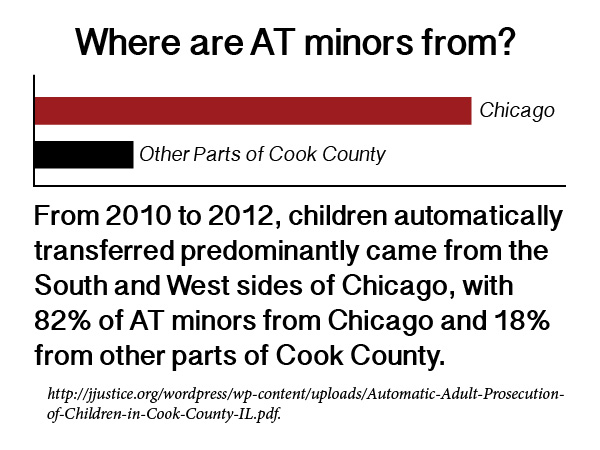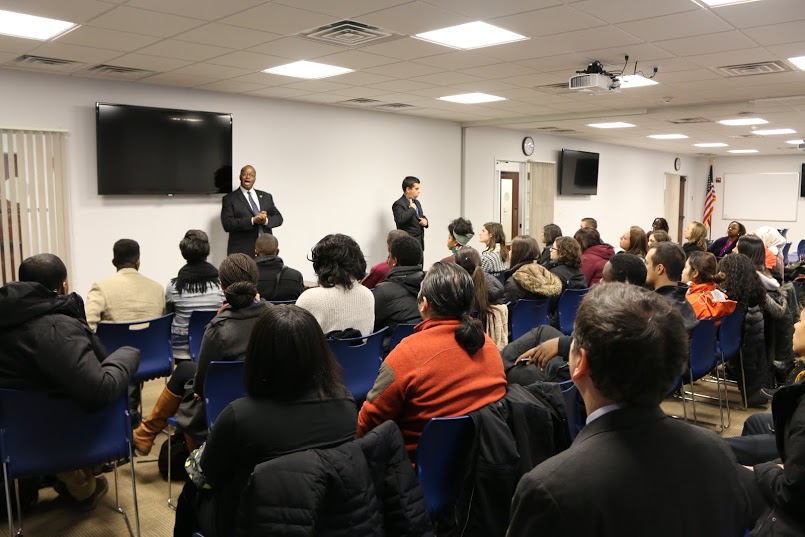What does it mean to Ruby Pinto that prosecutors instead of judges decide which kids are tried as adults? “It’s a system that targets the poor and especially people of color for harsher sentencing. We need to start looking at the person that enters the courtroom, not just the crime they’ve been accused of. Especially in the case of young people, a blanket policy that gives power to an interested party is not a smart approach.”
Ruby is a community leader from the South Side grassroots organization SOUL. On December 12, she and others from across Cook County filled the board room to hear how the Cook County Board President was answering the White House’s My Brother’s Keeper Challenge.

“At the heart of the President’s message is the need to keep young black and brown boys and men in school and on track to complete high school and postsecondary education and training.” Preckwinkle stated at the beginning of her My Brother’s Keeper Summit. She continued, “We answered the President’s call to action. We are determined to end unfair laws that prevent young boys and men of color from reaching their educational and professional potential. We want to start by ending the automatic transfer of juveniles to adult court. This is a deeply unfair practice that disproportionately impacts youth of color.”
Click here to download the Automatic Transfer Cook County Fact Sheet.
In a somewhat surprise move, Preckwinkle responded to Obama’s call to “ensure that all youth, specifically boys and men of color, have opportunities for education, advancement and personal and professional success” by taking on a vestige from the ‘tough on crime’ 1980s that reeks of structural racism. All told, President Preckwinkle, her Chief of Staff Kim Foxx, Robert Listenbee from the US Department of Justice, and Illinois State Representative Elaine Nekritz each spoke on the importance of ending automatic transfers.
 This was exciting news for the group of Public Allies who attended the summit to learn how elected officials take on difficult community issues and address racial disparities within their jurisdiction. The Allies are young leaders who are committed to careers in the nonprofit and government sectors and are currently serving 10 months as volunteers. Bethany Garling, a member of the group, was inspired by the summit: “The work that Preckwinkle is doing to stop automatic transfers is a direct reflection of the type of change that needs to take place- an individual using their influence to take control of one piece of this system and reconstruct it in a very intentional way.”
This was exciting news for the group of Public Allies who attended the summit to learn how elected officials take on difficult community issues and address racial disparities within their jurisdiction. The Allies are young leaders who are committed to careers in the nonprofit and government sectors and are currently serving 10 months as volunteers. Bethany Garling, a member of the group, was inspired by the summit: “The work that Preckwinkle is doing to stop automatic transfers is a direct reflection of the type of change that needs to take place- an individual using their influence to take control of one piece of this system and reconstruct it in a very intentional way.”
The reality of racial disparity within the criminal justice system has weighed heavy in the minds, and daily lives of many residents. Pinto explains, “As the nation grapples with the racial justice issues surrounding the killings of Michael Brown, Eric Gardner, and other young black men, we see a national movement growing around the demand to end police brutality toward people of color. The “Black Lives Matter” discussion is rapidly expanding into other aspects of the criminal justice system.”
 The Cook County My Brother’s Keeper Summit presented an opportunity to see how Government leaders address structural inequity. Preckwinkle has taken a hard look at the Justice System in Cook County. She identified the practice of automatic transfers of juvenile defendants to the adult correctional system to be one of the most racially disparate practices in the administration of justice in Cook County. Quoting a study from the Juvenile Justice Initiative, she reported that over the course of three years, 257 young people were automatically transferred and only one was white. Further, that over the course of the study, the annual percentage of African Americans who were automatically transferred rose 15 points to 83%.
The Cook County My Brother’s Keeper Summit presented an opportunity to see how Government leaders address structural inequity. Preckwinkle has taken a hard look at the Justice System in Cook County. She identified the practice of automatic transfers of juvenile defendants to the adult correctional system to be one of the most racially disparate practices in the administration of justice in Cook County. Quoting a study from the Juvenile Justice Initiative, she reported that over the course of three years, 257 young people were automatically transferred and only one was white. Further, that over the course of the study, the annual percentage of African Americans who were automatically transferred rose 15 points to 83%.
Up until 1982, judges made a decision if a juvenile defendant would be charged as an adult or not. At that point law began to change so that young people charged with certain serious offenses were automatically tried as adults. How the court treats a young defendant is now determined by the charges the prosecutor decides to bring against them, not the careful discretion of an impartial judge. Preckwinkle stated, “We are sending young people to the adult system for lesser crimes than when judges made this crucial decision and almost every single one of them is black or brown. This is deeply disturbing. The lack of due process robs young people of the fair hearing to determine whether or not they are suitable for the juvenile system’s rehabilitative opportunities.” She also explained that this practice is a major driver of the increasing costs and population of the Juvenile Temporary Detention Center, citing an 81% increase in the JTDC automatic transfer population from last year.
 Robert Listenbee, the Administrator of the Office of Juvenile Justice and Delinquency Prevention with the United States Department of Justice explained the White House is committed to evidence based policy and has learned that punitive juvenile justice systems are not very effective and that a public health mindset is key to building successful interventions for young people involved in the justice system. Further that, “Automatic transfer policies do not take this evidenced based information into account and they do not improve either public safety or the lives of the children that they affect.”
Robert Listenbee, the Administrator of the Office of Juvenile Justice and Delinquency Prevention with the United States Department of Justice explained the White House is committed to evidence based policy and has learned that punitive juvenile justice systems are not very effective and that a public health mindset is key to building successful interventions for young people involved in the justice system. Further that, “Automatic transfer policies do not take this evidenced based information into account and they do not improve either public safety or the lives of the children that they affect.”

After the Summit, Kim Foxx, Robert Listenbee and his Senior Policy Advisor Georgina Mendoza all took time to debrief the event and their efforts with the Public Allies. In an encouraging closing of the summit, they challenged the Allies to create the change that they want to see in the world. Afterwards, Garling had this to say, “Many of us come from families and communities that had been excluded in a variety of contexts; a lot of Allies have been primarily treated as though they are someone to be ignored or feared. Considering this, it was extremely meaningful to have someone in a position of power speak to us as though we are powerful, valuable people capable of making meaningful change.”
A very powerful and eye opening article. As a director of a probation department, I believe we should look at the “research” and enact evidenced based principles. There should be a Summit for all counties in the State of Illinois to address these issues. I look forward to hearing more about this issue and creative solutions and alternatives.
LikeLiked by 1 person
Thank you for your interest and input Patrick. In your opinion, what are some sources for relevant research? Have adequate studies been done, or should more research be completed? What factors should be considered? We hope to cover this and other juvenile justice issues thoroughly. Any thoughts you have on solutions and alternatives would be much appreciated. Please send us your thoughts at cookcountyjusticewatch@gmail.com.
LikeLike